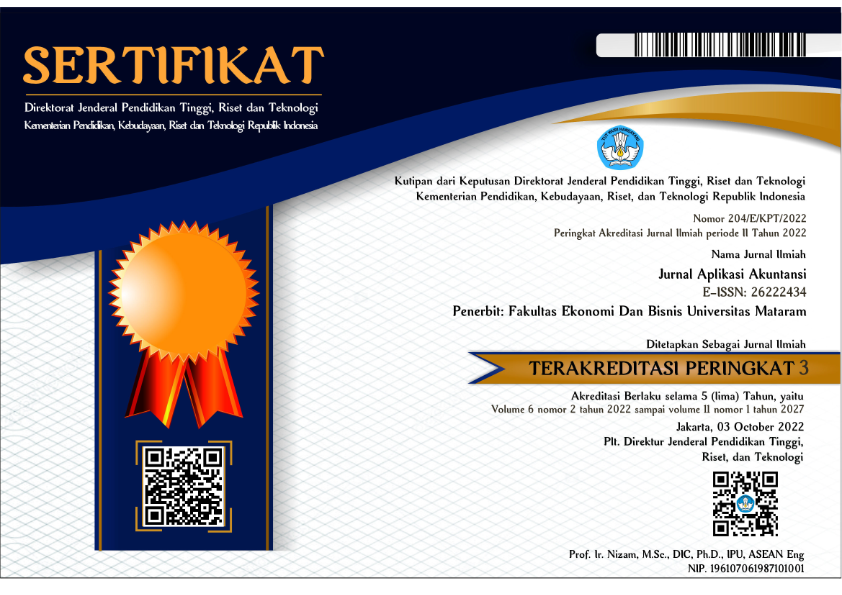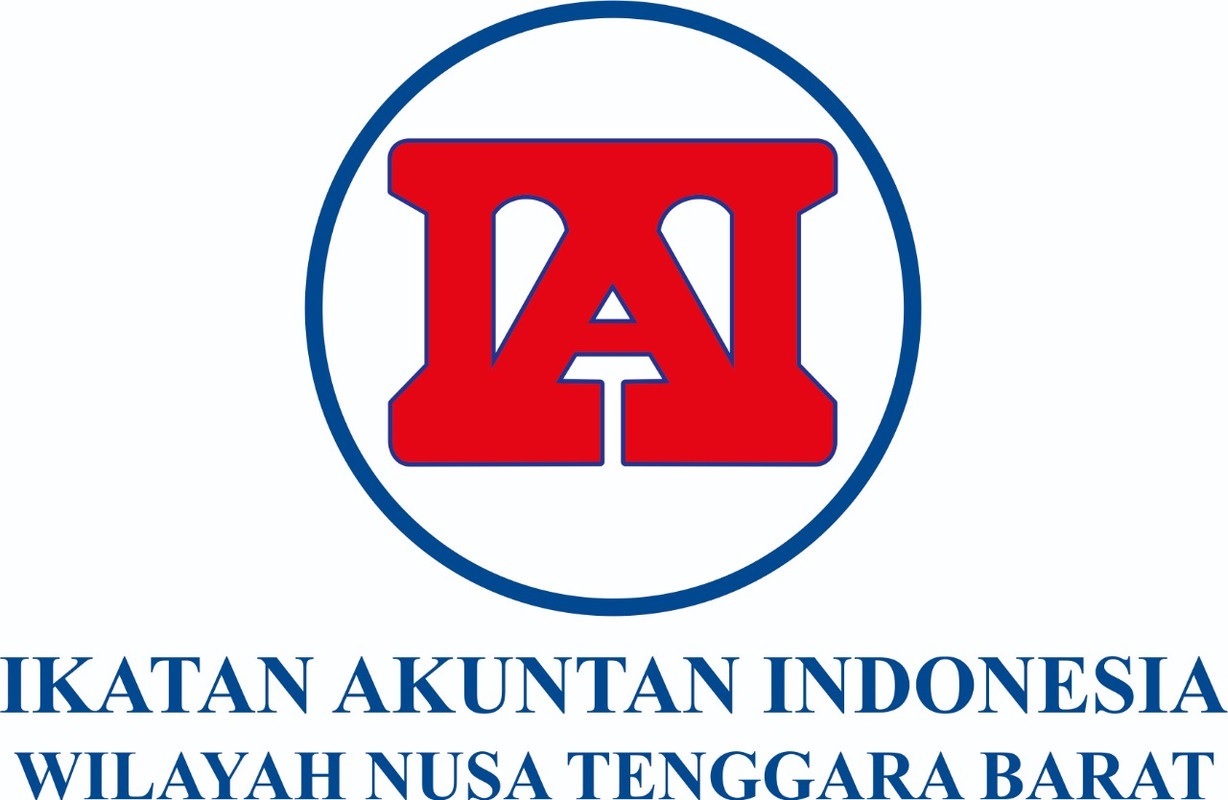INDONESIA’S TAX LANDSCAPE: UNVEILING CBCR AND TAX HAVENS WITH INSTITUSIONAL OWNERSHIP
DOI:
https://doi.org/10.29303/jaa.v8i2.386Keywords:
country-by-country-reporting, tax havens, institutional ownership, tax avoidanceAbstract
This study examines the effects of country-by-country reporting (CbCR) and the utilization of tax havens on tax avoidance strategies while taking into account the moderating effect of institutional ownership. This study employs purposive sampling techniques to evaluate data from 140 businesses listed on the Indonesia Stock Exchange (IDX) in Indonesia from 2013 to 2022. The data analysis is conducted using Eviews 13 software. The research findings suggest that the adoption of CbCR is successful in mitigating tax avoidance strategies. Conversely, tax havens have a negligible effect on tax avoidance. Institutional ownership has the ability to minimize the impact of CbCR by diminishing the correlation between CbCR and tax avoidance. Nevertheless, the presence of institutional ownership does not mitigate the effect of tax havens on the adoption of tax avoidance strategies. This study enhances comprehension regarding the functions of CbCR, tax havens, and institutional ownership in relation to tax avoidance in Indonesia. The practical ramifications of this study include the implementation of CbCR policies to improve corporate transparency and the exploration of various factors that influence tax procedures at the company level in Indonesia.
References
Abdani, F. (2020). Political connection and tax avoidance on sharia stocks; good for business? Al-Amwal : Jurnal Ekonomi Dan Perbankan Syari’ah, 12(2), 157. https://doi.org/10.24235/amwal.v12i2.7182
Aryotama, P., & Firmansyah, A. (2020). The Effect of Corporate Diversification, Customer Concentration on Tax Avoidance in Indonesia. Jurnal Akuntansi Dan Bisnis, 19(2), 196. https://doi.org/10.20961/jab.v19i2.475
Ayuningtyas, F., & Pratiwi, A. P. (2022). Pengambilan Keputusan Penghindaran Pajak Pada Perusahaan Multinasional Berdasarkan Multinasionalism, Pemanfaatan Tax Haven Dan Thin Capitalization. Jurnal Ilmiah Mahasiswa Ekonomi Akuntansi, 7(2), 201–212. https://doi.org/10.24815/jimeka.v7i2.20954
Bucovetsky, S. (2014). Honor among tax havens. Journal of Public Economics, 110, 74–81. https://doi.org/10.1016/j.jpubeco.2013.12.007
Chang, M.-L., & Huang, D.-F. (2017). The Effect of Tax Reforms on the Association between Tax Avoidance and Ownership Structure. Accounting and Finance Research, 6(2), 206. https://doi.org/10.5430/afr.v6n2p206
Damayanti, H. H., & Prastiwi, D. (2017). Peran OECD dalam Meminimalisasi Upaya Tax Agresiveness pada Perusahaan Multinationaly. Jurnal Akuntansi Multiparadigma (JAMAL), 8(1), 1–227. https://jamal.ub.ac.id/index.php/jamal/article/view/664
Dharmapala, D., & Riedel, N. (2013). Earnings shocks and tax-motivated income-shifting: Evidence from European multinationals. Journal of Public Economics, 97(21), 95–107. https://doi.org/10.1016/j.jpubeco.2012.08.004
Dharmawan, P. E., Syahril, D., & Darmasyah. (2017). Determinan Penghindaran Pajak Dengan Corporate Social Responsibility Sebagai Variabel Moderasi. Jurnal Riset Akuntansi & Perpajakan (JRAP), 4(02), 183–195. https://doi.org/10.35838/jrap.2017.004.02.15
Doran, M. (2009). Tax Penalties And Tax Compliance. Harv. J. on Legis, 161, 111–161. https://scholarship.law.georgetown.edu/facpub/915http://ssrn.com/https://scholarship.law.georgetown.edu/facpub
Garcia-Bernardo, J., Janský, P., & Tørsløv, T. (2021). Multinational corporations and tax havens: evidence from country-by-country reporting. International Tax and Public Finance, 28(6), 1519–1561. https://doi.org/10.1007/s10797-020-09639-w
Gujarati, D. N., & Porter, D. C. (2010). Dasar-dasar Ekonometrika. Salemba Empat.
Haztania, S., & Lestari, T. U. (2023). Pengaruh Transfer Pricing , Karakter Eksekutif , Dan Koneksi Politik Terhadap Tax Avoidance Santi Haztania , Tri Utami Lestari. Cakrawala – Repositori IMWI | Volume 6, Nomor 1, Februari 2023, 6(Idx), 289–304.
Idris, U. (2013, March). Sengketa Pajak Toyota Motor Menanti Palu Hakim. Kontan.Co.Id. https://nasional.kontan.co.id/news/sengketa-pajak-toyota-motor-menanti-palu-hakim
Istiqfarosita, M., & Abdani, F. (2022). Political Connections and Thin Capitalization on Tax Avoidance During The Covid-19 Pandemic. E-Jurnal Akuntansi, 32(5), 1238. https://doi.org/10.24843/EJA.2022.v32.i05.p10
Jalan, A., & Vaidyanathan, R. (2017). Tax havens: conduits for corporate tax malfeasance. Journal of Financial Regulation and Compliance, 25(1), 86–104. https://doi.org/10.1108/JFRC-04-2016-0039
Januarti, I. (2004). Pendekatan Dan Kritik Teori Akuntansi Positif. Jurnal Akuntansi & Auditing, 01(01), 83–94.
Jiménez-Angueira, C. E. (2018). The effect of the interplay between corporate governance and external monitoring regimes on firms’ tax avoidance. Advances in Accounting, 41, 7–24. https://doi.org/10.1016/j.adiac.2018.02.004
Joshi, P. (2020). Does Private Country-by-Country Reporting Deter Tax Avoidance. Journal of Accounting Research, 58(2), 333–381. https://doi.org/https://doi.org/10.1111/1475-679X.12304
Kurniasih, L., Yusri, Y., Kamarudin, F., & Sheikh Hassan, A. F. (2023). The role of country by country reporting on corporate tax avoidance: Does it effective for the tax haven? Cogent Business & Management, 10(1), 95–107. https://doi.org/10.1080/23311975.2022.2159747
Kurniasih, L., Yusri, Y., & Syekh Hassan, A. F. (2022). Association of Tax Haven and Corporate Tax Avoidance: Does Political Connection Matter? International Journal of Economics and Management, 16(Special Issue 1), 1–13. https://doi.org/10.47836/ijeamsi.16.1.001
Kurniawan, N., & Saputra, A. (2020). Does The Recently Implemented Regulation On Country-By-Country Reporting Deter Tax Avoidance? Jurnal Akuntansi Dan Keuangan Indonesia, 17(1). https://doi.org/10.21002/jaki.2020.04
Leung, S. C. M., Richardson, G., & Taylor, G. (2019). The effect of the general anti-avoidance rule on corporate tax avoidance in China. Journal of Contemporary Accounting & Economics, 15(1), 105–117. https://doi.org/10.1016/j.jcae.2018.12.005
Manihuruk, B. P., & Novita, S. (2022). Penghindaran Pajak: Pengaruh Koneksi Politik dan Kepemilikan Institusional. Owner, 7(1), 391–400. https://doi.org/10.33395/owner.v7i1.1285
Marsela, M. (2016, January). Terbukti Kemplang Pajak, Apple Didenda Rp. 4,8 Triliun. CNN Indonesia. https://www.cnnindonesia.com/teknologi/20160104143624-185-102034/terbukti-kemplang-pajak-apple-didenda-rp-48-triliun
Merle, R., Al-Gamrh, B., & Ahsan, T. (2019). Tax havens and transfer pricing intensity: Evidence from the French CAC-40 listed firms. Cogent Business and Management, 6(1). https://doi.org/10.1080/23311975.2019.1647918
Moore, J. A. (2012). Empirical evidence on the impact of external monitoring on book–tax differences. Advances in Accounting, 28(2), 254–269. https://doi.org/10.1016/j.adiac.2012.06.002
Noviyani, E., & Muid, D. (2019). Pengaruh Return on Assets, Leverage, Ukuran Perusahaan, Intensitas Aset Tetap, dan Kepemilikan Institusional terhadap Penghindaran Pajak. Diponegoro Journal of Accounting, 8(3), 1–11.
OECD. (2013). Addressing Base Erosion and Profit Shifting. In OECD (Vol. 9789264192). OECD. https://doi.org/10.1787/9789264192744-en
OECD. (2023). Revenue Statistics in Asia and the Pacific 2023 ─ Indonesia Tax-to-GDP ratio Tax structures Personal income tax Social security contributions Value added taxes / Goods and services tax Other taxes on goods and services (Issue 29). https://www.oecd.org/tax/tax-policy/revenue-statistics-in-asia-and-the-pacific-5902c320-en.htm
Prima, B. (2019, May). Tax Justice Laporkan Bentoel Lakukan Penghindaran Pajak, Indonesia Rugi US$ 14 Juta. Kontan.Co.Id. https://nasional.kontan.co.id/news/tax-justice-laporkan-bentoel-lakukan-penghindaran-pajak-indonesia-rugi-rp-14-juta
Sebayang, R. I. B. (2019, January). Dokumen: Google Lakukan Penghindaran Pajak Rp. 327 Triliun. CNBC Indonesia. https://www.cnbcindonesia.com/news/20190104214635-4-49236/dokumen-google-lakukan-penghindaran-pajak-rp-327-triliun
Sikka, P., & Willmott, H. (2010). The dark side of transfer pricing: Its role in tax avoidance and wealth retentiveness. Critical Perspectives on Accounting, 21(4), 342–356. https://doi.org/10.1016/j.cpa.2010.02.004
Syakura, M. A. (2009). Perilaku Kepatuhan Wajib Pajak Badan. Jurnal Ilmu Administrasi Dan Organisasi, 16(2), 96–104.
Tax Justice Network. (2023). State of Tax Justice. https://taxjustice.net/reports/the-state-of-tax-justice-2023/
Taylor, G., & Richardson, G. (2012a). International Corporate Tax Avoidance Practices: Evidence from Australian Firms. The International Journal of Accounting, 47(4), 469–496. https://doi.org/10.1016/j.intacc.2012.10.004
Taylor, G., & Richardson, G. (2012b). The effect of the general anti-avoidance rule on corporate tax avoidance in China. Journal of Contemporary Accounting and Economics, 15(1), 105–117. https://doi.org/10.1016/j.jcae.2018.12.005
Wareza, M. (2019, July). Disebut Terlibat Transfer Pricing Adaro, Siapa Coaltrade? CNBC Indonesia. https://www.cnbcindonesia.com/news/20190704205102-4-82830/disebut-terlibat-transfer-pricing-adaro-siapa-coaltrade
Watts, R. L., & Zimmerman, J. L. (1986). Positive Accounting Theory. Prentice-Hall Inc.
Wijaya, S., & Rahayu, F. D. (2021). Pengaruh Agresivitas Transfer Pricing, Penggunaan Negara Lindung Pajak, Dan Kepemilikan Institusional Terhadap Penghindaran Pajak. Jurnal Informasi, Perpajakan, Akuntansi, Dan Keuangan Publik, 16(2), 245–264. https://doi.org/10.25105/jipak.v16i2.9257
Wulandari, D. S. (2022). Tindakan Agresivitas Pajak dipandang dari Teori Akuntansi Positif. Owner, 6(1), 554–569. https://doi.org/10.33395/owner.v6i1.631
Downloads
Published
How to Cite
Issue
Section
License
Copyright (c) 2024 Desi Pratiwi Adhila Khoirunnisa, Fadlil Abdani

This work is licensed under a Creative Commons Attribution-NonCommercial-ShareAlike 4.0 International License.









